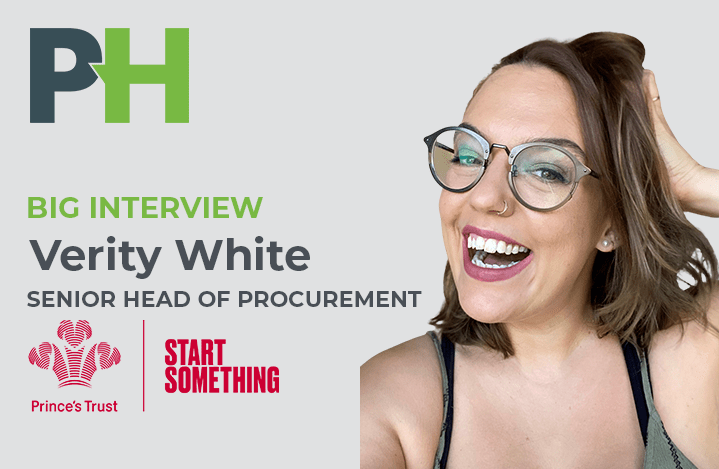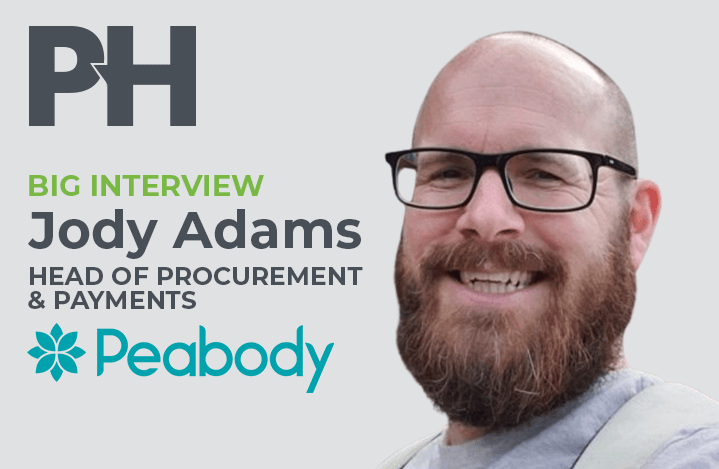For Procurement Heads‘ latest Big Interview, Verity spoke to Hayley Packham about her career and what makes the charity sector stand out in terms of a procurement career.
How did you get into procurement?
I completely fell into it by accident. I was working in sales for a recruitment company and was working on the account for Gloucestershire Council and they were looking for someone who could come and work for them and the Treasury on a programme called the consultancy value programme, what they needed was someone who could understand agencies and consultancies and understand how that works financially and contractually – I ended up getting the job.
I had years and years’ worth of training to try and catch up on, so I understood what Procurement and OJEU was. It was brilliant, and from there I have never really looked back as it was everything I liked from a sales job, which is the interaction, the negotiation and communications, but actually, I am here helping save money, initially in the public sector and now in the charitable sector and for me that fits ethically very nicely.
How did you find the transfer of skills from being outbound negotiations to having to look at some finer detail in the contracts?
I am quite a nerd so I really like reading contracts, picking them apart and going into negotiations on them. For me it is similar in sales when you are going through your negotiations – all those skills are the same you just flip it on the head so it has been really great how much my sales training helped me when I initially got into procurement.
What are the roles and responsibilities the procurement function holds within the Prince’s Trust?
It is a fairly new function. I started in Summer 2019 and have been taking them through a learning journey as they didn’t have anyone in procurement before I started.
It was seen as finance, processing purchase orders and now I like to think people realise it is its own function, it is risk, it is strategy, it is tendering and it is buying things efficiently and getting good value for money, but there is so much more strategy and skill needed within that.
We are slowly getting there.
I have recruited one whole person for my team and hopefully, we will be growing that. Procurement generally within the charitable sector is still growing, and there are a lot of charities that don’t have dedicated procurement resource. My work with the charity sector procurement group is really important to me, I want to show people in the sector what procurement can do, but also educate them what it is and isn’t about.
How do you advise other charities to split the function?
It would be wonderful to think we could go as in-depth as you might see in the public sector.
The fact is that you just do not have the money to go round so you have to be pragmatic about it, and write your policy in a way that means that you empower people to do their own quoting under a certain level and then have a hub and spoke approach where you have a centralised team of experts and then you have someone in each department who is trained in various procurement and negotiation techniques.
What are the biggest challenges you and your team face at the moment?
I would say that it is spreading the gospel of procurement around the company, especially working remotely, you are not in the offices having conversations about procurement and making those relationships that lead to you getting brought in early to projects – it is quite hard to manage that from your kitchen!
That and the dwindling budgets that we are dealing with, some people don’t understand that we don’t actually have any money!
There is a lot of work that charities do in terms of gaining revenue from grants, is that something that procurement gets involved with?
I am certainly pushing for us to be more involved in that! We tend to find that the people that are writing the bids aren’t necessarily looking at things in the same commercial way that you might look at them if you were in procurement so it is something that I am wanting us to get more involved in within the Trust.
What are you most passionate about when it comes to procurement?
I like doing a good job and showing that actually with a little bit of knowledge you can push things in the right direction and save money and make things more strategic. Procurement changes every single day, it is my favourite thing about it and I love that. I need that variety in my life, my passion comes from the fact that it is ever-changing.
I have worked in hospitals and highways where I have had to learn about things quickly, it is all different and it is fascinating.
You are never doing the same thing twice and I love that.
What do you think the key focus areas are right now for procurement to keep striving forward?
It is still about education and communication, that is always going to be it doesn’t matter how long procurement has been in place there will always be people who don’t understand it or don’t want to understand it.
I don’t think I have been anywhere where everybody followed the processes and policy and I think we have to just keep pushing forward and educating people that we are there to help them, that is a major push for me still.
Also, working in the charity sector, where we have lost a lot of income, there is a lot of pressure on everyone – people usually your input at the same time as there is a lack of proactiveness; there is a lot of pressure pulling us in different directions so that is quite difficult.
What do you look for when hiring?
One of the things I always look for is great communication, you can see from an interview if someone has got the gift of the gab or not and whether they could negotiate.
So, for me, it is very much about communication and personality fit. I did a little video on my LinkedIn when we went out to hire last year and I ended up getting more than 100 applications just because they got to see who it was they would be working with, so I think that worked well, it also put off people that wouldn’t like me!
A couple of people got in touch before they put their application in because they wanted to understand more about the role, and actually that put them heads and shoulders above the rest as they weren’t just throwing their CV at it.
What is your organisation doing with regards to sustainable procurement?
I have to say sadly it is not as advanced as I would like but I think that is primarily because they didn’t have a procurement function until 2019 – but it is something I am pushing to be sorted this year along with our social value and modern slavery work.
I want to make sure we have 10% graded against social value on all higher-level procurements. A lot of stuff we buy is services based so there is only so much you can do, but certainly when it comes to office consumables and stuff like laptops and furniture then a green agenda for me is really important.
We are also working with our energy brokers to look at how we can become greener. With Prince Charles as our patron, it feels as though we really need to nail this!
I lean towards implementing it as a policy as I believe it is the responsibility of everybody, not just one person. It shows you are committed as an organisation to have that policy piece as something that you are audited on, it pushes people in the right direction.
Is there anything you have seen that charities have struggled to procure during the pandemic?
We have not been as badly impacted as the NHS, some charities were struggling to get hold of PPE at the start but not all charities, as it doesn’t fit with what all charities are doing.
To be honest, Brexit has been more of an impact, and the delays on things like ICT products coming into the UK and the uplift of the pricing.
The fact that we have had to shut our centres has been a nightmare, but we have not struggled to get hold of anything due to Covid.
In terms of procurement careers what makes the charity sector stand out?
I genuinely think I love the fact that I am doing something super ethical and every pound I save can go towards somebody having a better life.
The charity sector in general also really do look after the health and wellbeing of their employees. Moving from being a self-employed consultant into an employed role was a big step for me, but I am really glad I did it, they do look after me and I can’t think of a better company to work for.
Stepping out of the interim market into a procurement leadership role, how do you think your skills transferred to become a procurement leader?
In the interim market, I had stepped into the role of procurement leader a few times so it wasn’t something I was frightened of. Of those times I had been into two other greenfield sites and set up from scratch their policies and processes. There is a lot of work to do here and that makes it very exciting that we have a long way to go and I want to embed it and it be a permanent change for the better for them. I was quite used to being my own boss so I was quite nervous, however, I report to the CFO here and he lets me get on with everything in my way.
What advice would you give someone who was looking at a greenfield Head of Procurement role?
Always get as much info as you can before you make any decisions. I think if you plough in somewhere without testing the water of the as-is it is not going to work, you have got to look at it holistically and with other people in mind, you can’t just make a decision and roll it out without talking to other people about how it will affect them.
Who would you say has influenced your career the most?
When I got my first role in procurement I had an amazing Head of Procurement and mentor, her name was Claire Smart, and she went on to work at the National Trust as their Director of Procurement. When I started in the sector I got involved in this charity sector procurement group and low and behold who was the chair but Claire!
It is weird but she has been a massive influence and the way that she is very open and honest with people was amazing. There is also a brilliant Head of Procurement at Salisbury Hospital, Rob Webb, when I got my first self-employed procurement role I worked with him, those two guys have set me up for life, I owe them a few pints!
What role have you and the procurement function played in enabling the company to face the pandemic?
As soon as I knew this was coming I sat down with the board and said what I think we need is a strategic spending freeze and stop anyone from spending anything so we can control what’s going out. We knew the impact this would have on our income.
We implemented several different things whereby every request a purchase order comes through my team first to be checked that it has followed the policy and that it is allowable spend. That is really admin heavy, I didn’t get anyone in my team until August so the first six months of the pandemic I was sat processing purchase orders and couldn’t take any leave!
On the plus side, it meant that I got more involved with more people in the Trust so the influence of Procurement spread wider. We essentially became a bit of a gatekeeper and, although it did frustrate some people, it needed to be done as we didn’t have a view of the majority of what was being spent until it was already committed. It helped.
Now we have gone into a stage of forward planning and I am feeding into that as a subject matter expert around all of the risks and issues that might come out of this from a procurement and commercial point of view.
How has the business changed since lockdown?
It has changed a lot, we have had a lot of people on furlough which was one of the things that did help it has been a real lifeline. All staff also went down to four days a week rather than five through the first 6 months.
We have become more technology-driven as an organisation which has been a challenge as we don’t have a lot of money to spend on tech. We have also to choose our battles wisely on what is and isn’t truly needed We are looking at moving a lot of our delivery onto digital platforms now rather than face to face. That in turn changes our footprint and estates footprint. How many of these centres do we need?
It is definitely going to be quite a different place but still delivering the great stuff that we always have.
What would you do differently with the benefit of hindsight?
I would still put the spend exception in place, I would block out some categories that I now know we are happy to ring-fence. To be honest there is not a lot I would do differently apart from fight harder to get more staff in more quickly!
How do you see procurement changing as a result of the pandemic?
We have already made a move to picking up Amazon as our tail-end spend partner for small purchases and that takes away a lot of admin from not only my team but finance so that is great.
We are looking at setting up a due diligence platform, I am making a business case for ongoing monitoring and due diligence for all of our supply chains that will automatically ping to us when there is a problem so we can then make intelligent decisions about who we work with.

What do you like to do in your spare time?
At the moment it is sitting on the sofa and watching Netflix! I am also a musician so back in normal times I was out gigging at weekends and I still am writing lots of music. I also like cooking, art galleries, theatre and a lot of creative things.
What advice would you give your younger self?
Believe in yourself a little bit more!
I needed to learn that, I struggled with self-confidence and still do.
Do you have an interesting fact about yourself?
When I was four I nearly died because I shut myself in a fridge on a family holiday! I was playing hide and seek on my own and I got in the fridge, what I didn’t realise was that it was airtight! Eventually, my mum and dad heard a little voice saying ‘help’ and they saved me! I’ve been claustrophobic ever since.
Do you have a personal motto?
Be yourself because everybody else is already taken. I stole that from Oscar Wilde!






